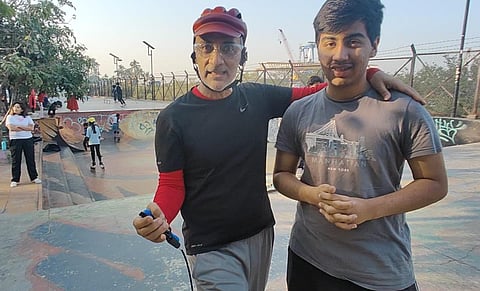

Skateboarding is an exhilarating and dynamic sport, but for beginners, it can be intimidating. I have been roller skating for the past nine years and have won 17 Gold, 7 Silver, and 12 Bronze medals across Speed Skating, Inline Freestyle, and Roller Freestyle disciplines. I represented India and stood 5th in Junior Men Roller Freestyle Qualifying at the World Skate Games 2022 in Buenos Aires, Argentina.
Sports have instilled in me discipline, diligence, and time management. They’ve taught me how to win honorably, lose gracefully, adjust with peers, and command respect. To give back to the roller skating community that raised me, I developed a website called SkateStop. It’s a platform for connecting skaters, sharing stories, buying/selling products through a marketplace, and discovering skateparks across India.
Despite having almost a decade of roller skating experience, I still see how common challenges deter many newcomers to skateboarding. I have conducted skateboarding workshops with Angel Express, a Mumbai-based NGO, at community parks, and with a running club, teaching over 100 people how to start skateboarding. I’ve spent countless hours at skateparks, witnessing skateboarders fall, lose control, and even suffer injuries. These experiences instilled a fear in me early on. Falls and injuries not only discourage beginners but also slow the growth of a thriving skateboarding community, which has the potential to be both a recreational outlet and a sustainable mode of transport.
To address this issue, I designed a hand-controlled braking system for skateboards — essentially “training wheels” for new skaters. This innovation allows beginners to regulate their speed and stop safely, significantly reducing the risk of accidents. Beyond its practical benefits, the hand-held brake provides a psychological boost, helping learners feel more in control and confident as they progress. I have participated in some of the biggest student robotics competitions in the world for several years, including FIRST Tech Challenge, FIRST Robotics Competition, and World Robotics Olympiad.
Combining my knowledge from both domains, I explored various fundamental designs before settling on a low-profile, simple mechanical system operated by a cycle brake lever.
Beyond recreation, skateboarding is also a highly efficient means of transport. Compared to bicycles, it is lightweight, portable, and easy to store, and unlike roller skates, it’s ready to use within seconds. With its low environmental impact and enhanced safety features, my innovation makes skateboarding a more practical and sustainable option for short-distance travel.
By improving accessibility and safety, this project enhances the skating experience and promotes skateboarding as a viable, eco-friendly mode of urban mobility.
My two-stage design process included 3D-printing prototypes for testing, followed by laser-cutting the final parts from 5 mm mild steel sheets. These components were welded together to create the brake. I rewired a cycle brake replacement kit for precision and initially used a spring for brake retention, but switched to rubber bands for cost-effectiveness and ease of replacement. Emphasizing simplicity, I repurposed an old duster stick as the brake handle, avoiding unnecessary production while ensuring efficiency. This practical and straightforward approach embodies my philosophy of functional engineering.
I have advocated the idea in front of 150-200 people and conducted qualitative trials, collecting feedback from them. Amongst the 60-70 individuals who tried the skateboard with a brake, 50 were complete beginners. Only one minor fall occurred, described as a disbalance rather than a serious incident, thanks to the brake’s control. Skate coaches believe it could help older casual skaters and young learners, provided they don’t become too dependent.
A 65-year-old first-time user noted that the brake lever gave him comfort, motivating him to persist despite near-falls. This product fills a community gap, aiding beginners, advanced skaters refining skills, and recreational users, making skateboarding more accessible and potentially tripling its popularity.
I plan to use the brake system to make skateboarding more accessible, encouraging more people to take up the sport and increasing its popularity. By removing safety concerns, this initiative could help foster a new wave of skaters who see the sport as both recreational and competitive.
Through this effort, I hope to inspire young talent who might naturally excel at skateboarding. For example, future competitive skaters could emerge from this initiative, making a significant impact in competitions and, more importantly, on their own lives. Currently, I am mentoring 3 promising amateur skateboarders from underserved backgrounds to prepare for their first national-level competition. The goal is to show how skateboarding can open doors to new opportunities.
(Shauryaveer Varma is a Class XI student of Dhirubhai Ambani International School. Views expressed are his own.)
